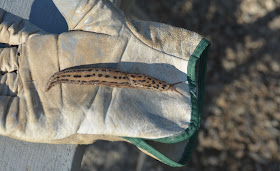Slugs!
Through my gardening years, I have had to deal with only two kinds of slugs, both a few centimeters long (I call them the whites and the greys, not having the required competence to identify these slugs by their proper scientific names).
The first, the little whites, vary from beige to brown and have very thin skin (they can easily be dispatch with a trowel). The other kind (the little greys) are always the same colour - dark grey on top with a snow-white belly. These have a very thick skin the texture of a piece of leather.
However what this post is about is a third kind of slugs for which I did find the Latin name: Limax maximus. Here is another photo of it in all its splendor.
Commonly known as the European giant garden slug, or the spotted garden slug , it appeared in the garden for the first time last summer. No doubt it hitched a ride in a potted plant. In fact it has probably been in the garden for a while as I did find six of them over the summer.
I was shock to read in the Wikipedia article about Limax maximus that "The adult slug measures 10-20 cm (4-8 in) in length". This means that what for me were humungous slugs were actually babies! How much of a hosta does an 20 cm slug eats in a night?
Reading that "This species has a very unusual and distinctive mating method, where the pair of slugs use a thick thread of mucus to hang suspended in the air from a tree branch or other structure." I realize I will now have to look up as well as look down for slugs!
Wikipedia adds "Although native to Europe, this species has been accidentally introduced to many other parts of the world."
I wonder if other North American gardeners have seen it and if the European gardeners have special ways of dealing with Limax maximus?
Through my gardening years, I have had to deal with only two kinds of slugs, both a few centimeters long (I call them the whites and the greys, not having the required competence to identify these slugs by their proper scientific names).
The first, the little whites, vary from beige to brown and have very thin skin (they can easily be dispatch with a trowel). The other kind (the little greys) are always the same colour - dark grey on top with a snow-white belly. These have a very thick skin the texture of a piece of leather.
However what this post is about is a third kind of slugs for which I did find the Latin name: Limax maximus. Here is another photo of it in all its splendor.
 |
| European giant garden slug |
Commonly known as the European giant garden slug, or the spotted garden slug , it appeared in the garden for the first time last summer. No doubt it hitched a ride in a potted plant. In fact it has probably been in the garden for a while as I did find six of them over the summer.
I was shock to read in the Wikipedia article about Limax maximus that "The adult slug measures 10-20 cm (4-8 in) in length". This means that what for me were humungous slugs were actually babies! How much of a hosta does an 20 cm slug eats in a night?
Reading that "This species has a very unusual and distinctive mating method, where the pair of slugs use a thick thread of mucus to hang suspended in the air from a tree branch or other structure." I realize I will now have to look up as well as look down for slugs!
Wikipedia adds "Although native to Europe, this species has been accidentally introduced to many other parts of the world."
I wonder if other North American gardeners have seen it and if the European gardeners have special ways of dealing with Limax maximus?


No, you are welcome to them exclusively. Keep us posted; don't send them.
ReplyDeleteIt is reassuring that so far no one has mention having seen an 8 inch long one!
DeleteYes, keep them up there with you!
ReplyDeleteI ma ready to keep some for you if you are interested!
DeleteThat is a huge specimen. I hope that I don’t find any although I read that the small sis caused the most damage and I’m sure that I have seen other slugs performing the same sort of mating ritual.
ReplyDeletePerhaps there is still a possibility of getting rid of them as they must all be in the garden. Hopefully they have not yet traveled far.
DeleteHaha, that's about normal size for us. Apparently these larger ones aren't as damaging as the small black ones. I'd rather have neither.
ReplyDeleteI hope you are right Sunil.
Delete😨
ReplyDeleteOH my goodness! I Hope I never find those in my USA zone 5 garden. I have small ones about a half inch long-YUCK..but in a strange way they are pretty:-)
ReplyDeleteCheck every plant you buy as I am sure they came in a pot, perhaps as eggs.
DeleteHaven't seen it yet, thank God!
ReplyDeleteOh wow. I'm going to have to keep an eye out and see if they're around. Like you I've pretty much limited myself to whites and greys... and to be honest have been ok with that.
ReplyDelete